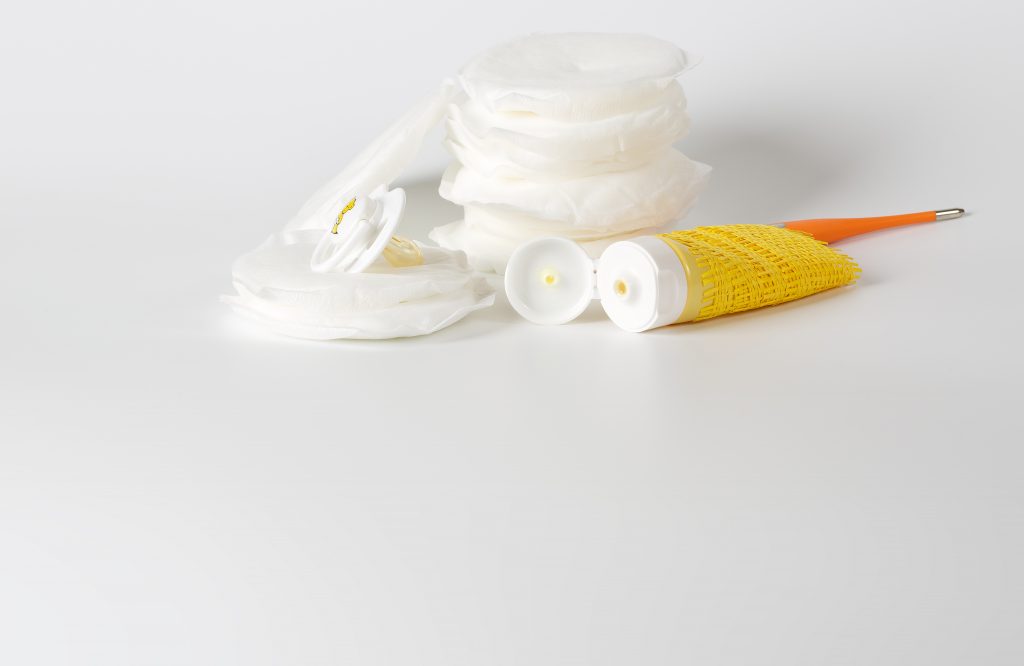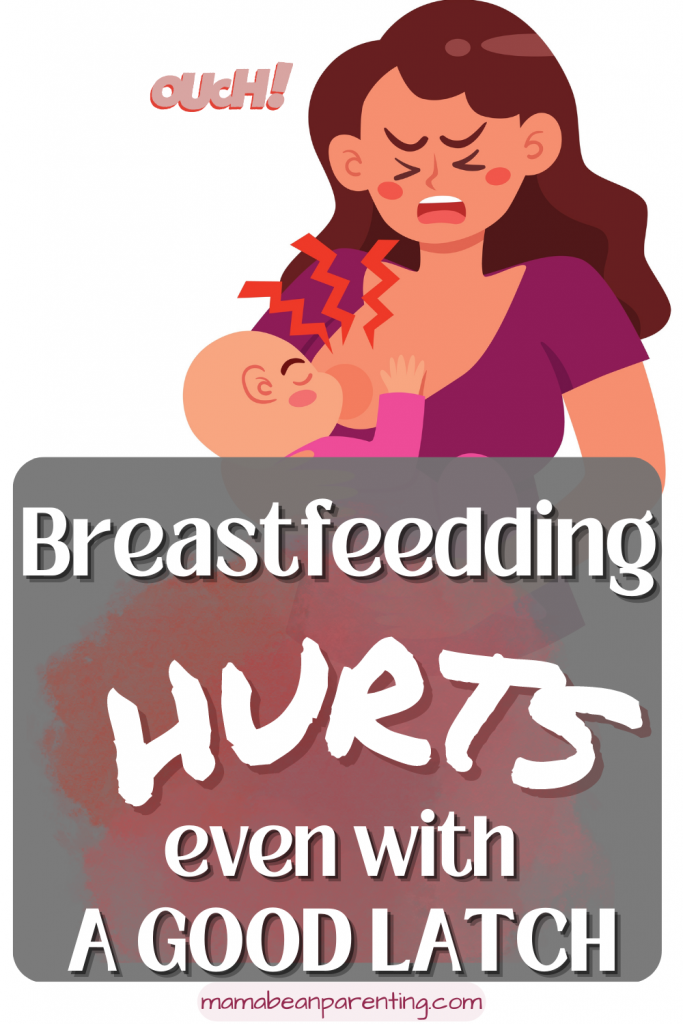If your breastfeeding hurts even with a good latch, that can be very stressful for you as a new mom.
Breastfeeding is one of the most amazing things in this world. It’s such a natural and beautiful thing that strengthens the connection between a mother and a child.
Even though breastfeeding is emotionally beautiful, it is often challenging. Many breastfeeding moms have problems with nursing in the beginning. It can be painful, uncomfortable, and exhausting.
However, your breast milk is the best food for your baby. So, you’re ready to find the solution to your problems. Breast milk contains everything your child needs and it’s amazing for building the baby’s immune system.
As a mom, you want what’s best for your baby. So even if it hurts and even if you’re tired, you will keep trying. When breastfeeding hurts even with a good latch, there can be a few things connected to this.
In this article, you will learn more about everything that could make your breastfeeding experience difficult.
Signs Of A Good Latch

A breastfeeding latch is a way of your baby attaching to your breast. A good latch is essential for successful breastfeeding. The next things represent signs of a good latch:
- Baby’s head is straight, and his or her chest and stomach are against your body
- Baby’s mouth is covering the area around your breast, not just the nipple area
- Baby’s chin is touching the breast and baby’s tongue is under your breast
- You can see and hear the swallowing
Another important sign of a good latch is the absence of pain. However, if everything else is quite right, it’s possible that you have a good latch, but there is some other problem.
Before you figure out why breastfeeding hurts even with a good latch, you have to be 100% sure that there is actually a good latch. If you can’t recognize the signs above, I will give you some suggestions.
So, for handling a poor latch you should try these tips and tricks:
- Be comfortable – find a comfy position for you and your baby. There are many nursing pillows and supporters that will help you and your baby to be in the right position for breastfeeding. Nursing position can make a big difference for baby’s latch.
- Besides, a breastfeeding session last about 20-30 minutes. It’s important to be relaxed and comfortable.
- Hold your baby on your chest and make sure to experience skin-to-skin contact – it’s important to allow your baby to feel you. Babies have a natural instinct to nurse.
- Find a way to encourage your baby to open the mouth – try to touch the upper lip with your breast. When your baby has a wide open mouth, a good latch is easily achievable.
Breastfeeding is natural, but it takes a lot of time and practice. The best thing you could do is consult a lactation consultant if you’re having problems. Also, a good tip is to ask for advice while you’re still in the hospital after the delivery. That way, you will know what to do from the start and you could avoid the problems.
What Is Lactation Consultant?
A lactation consultant is a trained professional who specializes in breastfeeding. Some of lactation specialists work in hospitals, but some of them have private offices.
A lactation specialist is needed in the first weeks after the child’s birth. If you’re having any sort of problems with breastfeeding, you can contact this kind of expert.
Breastfeeding usually comes naturally, but that’s not the rule. If you have sore nipples, clogged or plugged milk ducts, low milk supply, problems with latching, or a hungry baby, you can always hire a professional.
There are many resources that will help you to solve the lactation problems on your own, but if you can’t do it, and you want to breastfeed, a lactation consultant is a great idea.
Many breastfeeding moms just need some time and some practice. If this is your first time breastfeeding, it’s normal to have sensitive breasts. It will take a few weeks to get used to everything. So, some sensitivity, in the beginning, is normal and temporary.
A lactation consultant is also useful if you have problems with your milk supply and milk production. Sometimes, breastfeeding as an action is going well, but you don’t have enough breast milk for your baby.
Your consultant will give you some guidelines and trips that will increase your milk supply. La Leche League is very famous for their experienced lactation specialists and breastfeeding help.
Breastfeeding Hurts Even With A Good Latch

If you’ve established that the breastfeeding latch is good but the breastfeeding still hurts, then it’s time to keep going. It’s possible to experience a good, but painful latch.
As I’ve mentioned, some mild pain, discomfort, and sensitivity are common in the beginning, but severe pain is not normal.
Unfortunately, many breastfeeding moms have the same issues. Therefore, I will give you some information about this problem that could help you to solve it.
Thrush
Thrush is a yeast infection that can develop anywhere in your body. Yeast infection can happen for many reasons. Using antibiotics for a long time or nipple damage can be the cause of breast thrush that can cause pain.
If it’s the thrush, your nipples are pink, sore, and cracked. You feel the pain and burning sensation in your breasts.
Besides, maybe your baby has an oral thrush that’s spread to your breasts. In this situation, you will need medications to make it go away. Just like you can get it from someone else, your baby could get it for you, if you don’t treat it.
To be honest, your baby probably has the thrush, even if there are no symptoms. You will get antifungal medications and creams, and your baby will also get antifungal drops or ointment.
When it comes to breastfeeding while experiencing breast thrush, you can keep going. Since you and your baby will both be treated, you can continue breastfeeding if it’s not too painful.
Try pumping or expressing your milk if it’s easier for you. Also, a good hygiene is essential. Keep your nipples dry and clean. Avoid wearing wet bras or pads. Finally, work on boosting your immune system.
Damaged Nipples
If the breastfeeding hurts even with a good latch, your nipples are probably damaged. You could have damaged nipples even without thrush or some other infection.
Breastfeeding is new to you, and your skin is still adjusting. Maybe the baby is pulling too hard and your skin is sensitive. If you have cracks or cuts on your nipples, you have to let them heal.
After the nursing, leave your breast in the air for some time. Let them breathe. Use oils and ointments for this condition. Lanolin cream is great for healing cracked nipples.
Also, your own breast milk is great for this. Just express some of it, and rub it all over your nipples. Good hygiene, air drying, and healing agents are crucial to solve this issue and relieving nipple pain.
Breast Engorgement
Breast engorgement happens when the milk is not completely removed from your breasts. It causes swelling, pain, and discomfort even when you’re not breastfeeding.
This can cause painful breastfeeding even with a good latch. It usually happens in the beginning when your colostrum is becoming regular breast milk. Sometimes, a diet change can also cause breast engorgement.
To treat this condition, apply warm compresses and massage your breasts. It’s important to lower the pressure. Another cause of breast engorgement could be increased blood flow to the breasts in the first weeks of breastfeeding.
Tongue Tie
Tongue tie is a condition that can make it hard for a breastfeeding baby to nurse. This is a medical condition where a strip of skin that connects the tongue with the bottom of a baby’s mouth, is shorter than usual.
Tongue tie makes it hard for the baby to nurse and that can be the reason for painful breastfeeding even with a good latch. This condition makes it hard for the breastfeeding baby to nurse properly. Baby might chew the nipple because of a tongue tie which makes the breastfeeding painful.
Frenotomy is a simple procedure that can solve tongue tie. It sounds scary, but it’s fast and efficient. Besides, tongue tie could be even more problematic for your child in the future. Speaking, eating, or brushing teeth is more difficult if a child is diagnosed with a tongue tie.
Nipple Eczema Or Nipple Dermatitis
It’s quite common to have damaged nipples than it is to have a particular medical condition such as eczema or dermatitis. Unfortunately, it’s possible and sometimes it’s hard to diagnose since damaged nipples are usual for new moms.
In this case, a doctor usually prescribes a certain cream. Also, avoiding harsh products that can irritate your skin further is necessary.
Vasospasm and Raynaud’s Syndrome
This disease presents itself in a form of vasospasm. A vasospasm happens when the blood vessel supplying the nipple goes into a spasm. That cuts the blood flow and the milk flow which makes the breastfeeding hurt even with a good latch.
This syndrome can be treated with different medications, oils, creams, and ointments prescribed by a doctor.
Paget’s Disease
It is very unlikely that this disease is the cause of painful breastfeeding. However, it is important to mention it.
Paget’s disease is characterized by nipple dermatitis and psoriasis, among other symptoms. There is also a lump behind the nipple and the skin is darker in this area. Sometimes, this disease is connected with breast cancer. The treatment of this disease is managed by your doctor.
Bacterial Infection
When it comes to painful breastfeeding, yeast infection is more common than bacterial infection. However, that doesn’t mean it is impossible to get it.
Our bodies get in contact with many bacteria and if your nipples are damaged, you may catch a bacterial infection.
This is usually treated with prescribed antibiotics. Some antibiotics can affect your milk, but your doctor will inform you about everything that has to do with further breastfeeding.
Pumping When Breastfeeding Is Painful

When you have a case of a painful latch, it’s important to find the cause. However, no matter what is the reason behind painful breastfeeding and painful latch, you have to make an effort to keep removing the milk from your breasts. It’s difficult, but you have to try. A better solution at the moment would be expressing or pumping your breast milk.
I understand that this is a hard decision if you’re exclusively breastfeeding, but it will save you from breastfeeding pain. Besides, if you’re in pain or you have some medical condition, it would be good to establish bottle feeding.
Pumping will also hurt, but since you’re more in control, it won’t hurt so much. This is a great solution if the cause of painful breastfeeding is tongue tie.
If you don’t have a lot of experience with pumping, I will give you some guidelines. Firstly, you can express the milk manually, without a pump. However, that is time-consuming and it takes a lot of practice to remove all the milk from the breast.
So, it’s better to find a good breast pump. A manual breast pump is cheaper, doesn’t require a power source, and it’s easier to clean. However, it takes more time, and you have to pump the milk by yourself.
Electric breast pumps are great. Even though you need a power source, you can be hands-free when using an electric breast pump. You have a single and double electric pump.
If you want to pump one breast at a time, a single one is great. However, if you want to pump both of your breasts at the same time, get a double electric pump.
There is also a wearable breast pump, but I wouldn’t recommend it if your breastfeeding hurts. Wearable breast pumps are convenient, but it’s better to use another kind because it’s easier to clean your breasts and dry them.
It’s also important to buy some containers or freezer bags for your breast milk. If you have a lot of milk, you should save it for later. A pumping session should happen every 2 to 3 hours, just like a breastfeeding session.
Of course, if the pumping is not working for you for some reason, there is always a baby formula. A baby formula will feed your baby and it’s healthy. Breast milk is better, but the formula also has important nutrients.
Besides, if you decide to use the baby formula, feeding your baby will be much easier. Your partner or a family member will be able to feed the baby. You won’t have to wear nursing bras, or cotton pads all the time.
Also, you don’t have to worry so much about your diet or taking certain medications. Since you’re not breastfeeding, you can’t transfer anything through the breast milk.
As you can see, there are some benefits of using baby formula. The most important thing is that you and your baby are healthy.
Treatment For Damaged Nipples

Damaged nipples during breastfeeding can happen for many reasons. Sometimes, your skin is just too sensitive and you’re having a hard time getting used to breastfeeding.
Sometimes, a poor latch can damage your nipple. As I’ve mentioned before, many medical conditions can be the cause of cracked, and damaged nipples.
Nipples are sensitive and even if there is just a small crack or cut, it can be very painful. Even when you’re not breastfeeding, painful nipples are a nightmare.
Luckily, many things can help you to treat your damaged nipples. The first choice is usually a lanolin cream or ointment. Lanolin is great because it has healing properties. Also, it creates a protective film and helps with the pain and discomfort.
Some people use Vaseline, but lanoline is a better choice for nipples. However, if you can’t use lanolin for some reason, you can always find something else. Some people are allergic to lanolin.
There are many products for this problem, so do your research and purchase the best. I suggest using some unrefined coconut or olive oil. This is a great natural remedy that will speed up the healing process.
Organic honey is also a great healing agent for cuts, cracks, and wounds. Of course, your breast milk is also useful when you’re having this issue.
Besides using these products, I suggest to step up your hygiene routine. Clean the affected area, dry it well after the cleaning, and go topless as often as possible. Avoid getting wet and sweaty, since this will only worsen the problem.
Staying Mentally Well

I’ve told you the best-case scenarios and the worst-case scenarios if your breastfeeding hurts. However, during this challenging time, your mental health could also be in danger.
First of all, this kind of pain is strong and unique. It truly feels like stabbing. It’s such a sensitive area and pain can make you very nervous.
Secondly, it’s hard when you’re having problems with feeding your child. You just want to nurse normally, but it seems impossible. You’re trying everything, and you’re still struggling.
You’re doing all of that because you know how good your breast milk is. It’s great for your baby’s health and you want to make this work. If you’ve truly tried everything, maybe it’s just not meant to be.
You being in pain for a long time is not good for you or your baby. Pumping, bottle feeding, or using baby formula is perfectly fine. If you’re still struggling to breastfeed, at least try to be positive and focus on success.
If you see that it’s not working, you have to keep your composure. Just because you’re not breastfeeding anymore, doesn’t make you less of a mother.
Your baby needs your love and care. Even though breastfeeding is something beautiful that is hard to leave behind you, there are many other beautiful things to enjoy.
Focus on healing yourself and helping your baby to adjust to a new feeding system. Don’t be sad because you can’t breastfeed anymore. It’s normal and common.
I would also like to say that it is also okay if you can breastfeed, but you don’t want to. Maybe the pain left a mark on you, and you don’t want to push through the pain until it stops.
That is completely fine. Your body is your choice, and you don’t have to do anything you don’t want to. Even if your breastfeeding is not painful, it’s okay to avoid it.
Your mental health is the most important part of all this. When you’re happy and content, you will work hard to take good care of your baby. If you’re pushing yourself to do something you don’t want to do, you will be one unhappy, new mom. So, don’t do that, and find a way to be satisfied with your life as a new mother.
Conclusion

I think that this article gave you plenty of information when you’re struggling with painful breastfeeding even with a good latch. If you read everything carefully, you will learn what a poor latch is, and what could be the cause of your painful breastfeeding.
Our bodies are magnificent, and there are so many great things about them. Unfortunately, there are also so many different conditions and diseases that can disrupt your balance and affect your health.
That’s why it’s important to stay informed and educated. You have to look after yourself, especially now, when you’re a mom. You have to be more responsible and serious about everything.
Breastfeeding is a process that can drain you emotionally and physically. Don’t ever compare yourself to someone else. Every person is unique, and just because some other moms have a great breastfeeding experience, doesn’t mean it will be the same with you.
It’s good to keep yourself in the loop, but always contact a medical professional when you’re dealing with some difficulties.
They exist to help you, so don’t hesitate to reach out and get all the help you need.
Hi all, I am Sidney, an accountant, a hobbyist photographer, and a mother to two sweet girls who are my motivation. I love sharing the tips and tricks I gained all these years I’ve been a mother. I hope it will help you!



Can You Use Icy Hot While Breastfeeding? • Mama Bean Parenting
Thursday 6th of April 2023
[…] breastfeeding hurts even with a good latch, then you should focus on solving that problem. There is no need to treat your breasts with topical […]
Breastfeeding Clicking Noise • Mama Bean Parenting
Wednesday 22nd of March 2023
[…] If you don’t position your baby right, it’s possible to experience painful breastfeeding even with a good latch. […]
Golden Hour After Birth: 9 Instinctive Stages & More • Mama Bean Parenting
Friday 3rd of March 2023
[…] If you face any problems breastfeeding in the future, here’s what you need to know. […]
How to Make Breastmilk Fattier? • Mama Bean Parenting
Thursday 16th of February 2023
[…] no mom can determine how much her baby has eaten while breastfeeding which is why they are unsure if the baby has received the right amount of nutrients during […]